They offer lower costs, fewer chemicals and a quicker route to being reborn — in one sense, anyway.
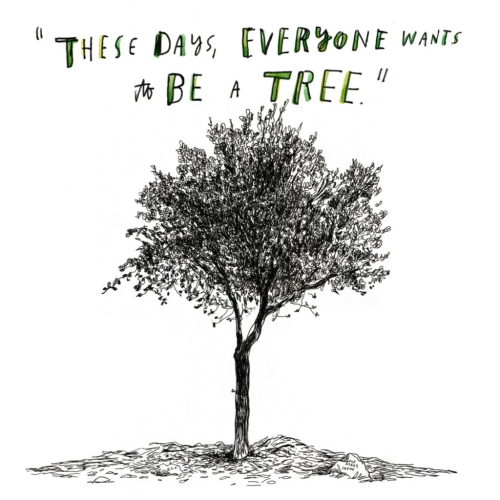
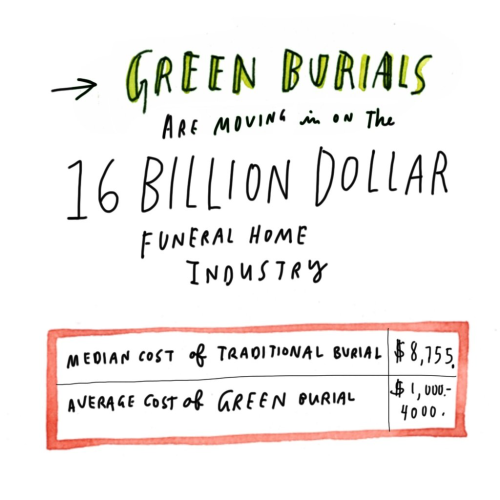
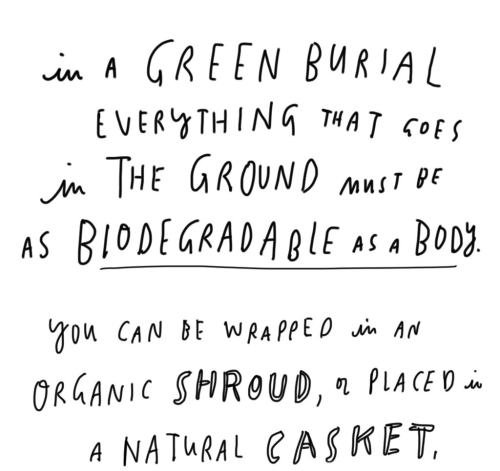
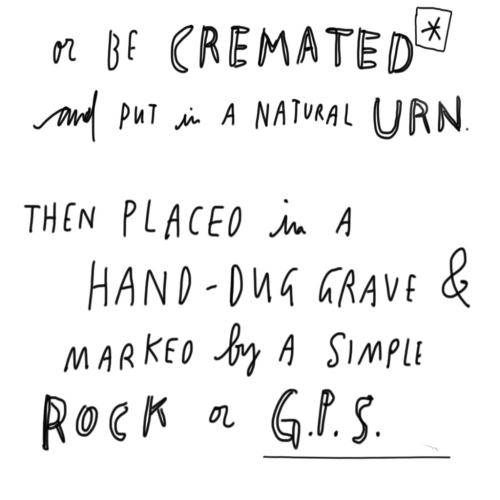
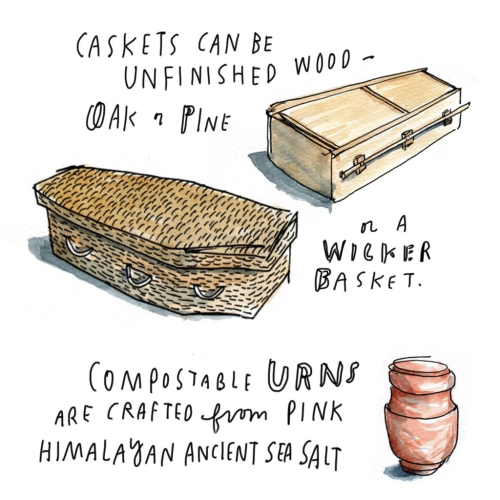
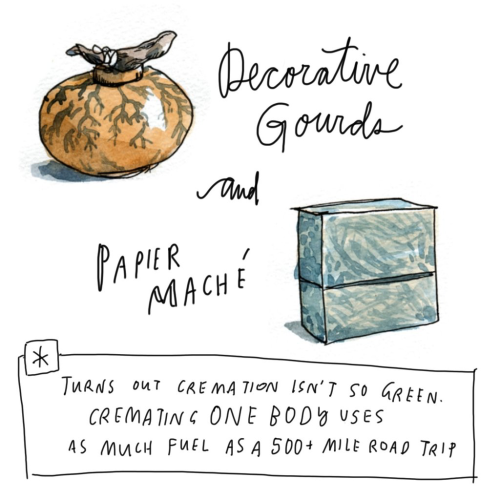
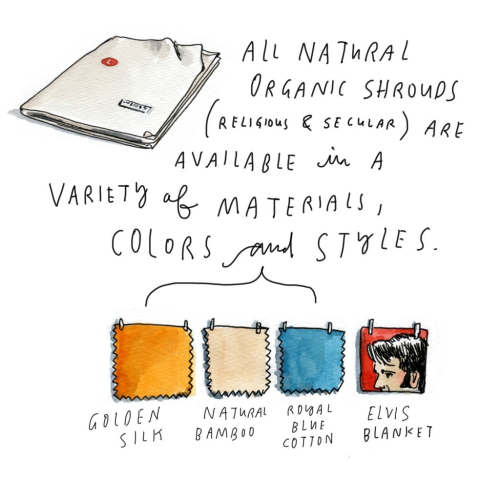
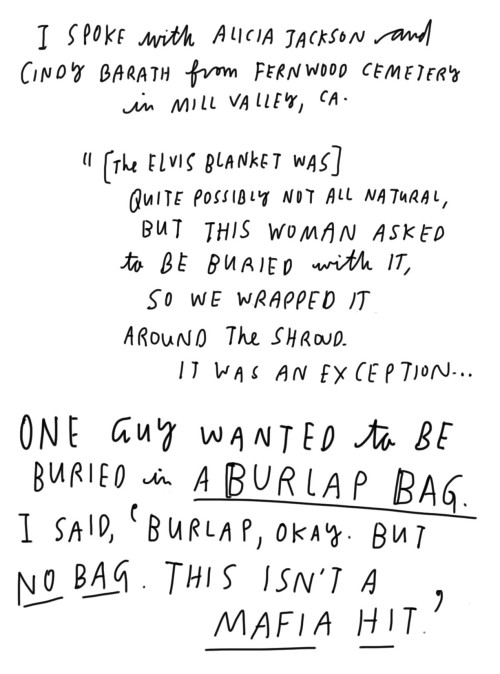

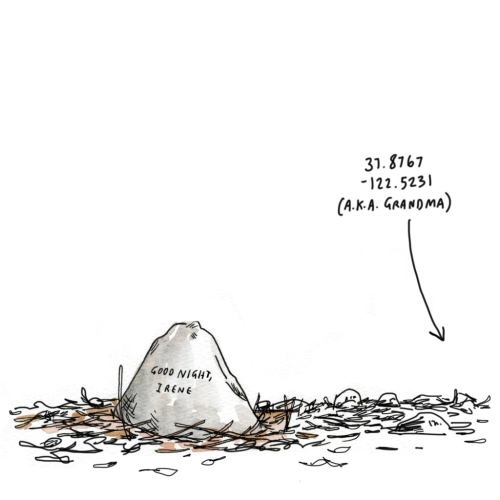
The New York Times / Meanwhile / Published: November 15, 2018
They offer lower costs, fewer chemicals and a quicker route to being reborn — in one sense, anyway.










Filed under Inspiration
Add value everyday.
Thanks Holley Murchison for consistently and reliably showing up, spreading love, teaching, adding.
>
Filed under Inspiration
Screen-addicted Americans are more stressed out and distracted than ever. And nope, there’s no app for that. But there is a radically simple remedy: get outside whenever you can. And when you can’t, research has found, just looking at images of nature will help you to perform significantly better on cognitive tests and feel better.
In our December issue, Florence Williams travels to the deep woods of Japan, where researchers are backing up the surprising theory that nature can lower your blood pressure, fight off depression, beat back stress—and even prevent cancer.
The Outside RX: Get Dirty
As hunter-gatherers and then settled farmers, humans touched, breathed, swallowed, and co-evolved with a broad range of microbes, says Graham Rook, professor emeritus of medical microbiology at University College London. These bugs—from gut flora and probiotics to bacteria and parasites—came to play an important role in regulating our immune system. They became, Rook says, our “old friends.”
The Outside RX: Go Blue
The Outside RX: Train Naked
These days, it’s the rare outdoor athlete who isn’t plugged into something: heart-rate monitor, iPod, power meter, GPS unit…. The assumption is that these gadgets improve our performance or experience or both. But there’s good reason to question that.
The Outside RX: Take Five—Minutes or Days
Five minutes is all that’s required to achieve the minimum effective dose of nature immersion to raise your spirits. So says Jules Pretty, professor of environment and society at the University of Essex, who synthesized the results of nearly a dozen studies for a comprehensive 2010 review of nature’s effects on the body.
Free Medicine
In a 2011 study of 128 college runners, researchers found that “surrounding greenness” was an indicator of better athletic performance. Other studies have shown that exercising in nature results in less fatigue, reduced anxiety, less hostility, more positive thoughts, and an overall feeling of invigoration. Read more on how research supports the therapeutic benefits of playing outside.
.
Filed under Inspiration
At Terminal 5 with Josh Ritter & the Royal City Band, I witnessed the greatest proposal ever, read by Josh on stage:
Blackbird,
I want to wake up with you everyday til I don’t wake up no more.
It’s more than six words, but at SMITH Magazine – home for storytelling, for passion, and inspiration in words – the Six-Word Memoir Project is one of my favorite spaces to find inspiration.
Filed under Inspiration
How green is your favorite clothing brand?
By Julia Westbrook
The main types of chemicals Greenpeace is calling for clothing companies to stop using are alkylphenol etheoxylates (APEOs), phthalates, and PFCs. Many companies have set “acceptable limits” on APEOs, but because these harmful chemicals accumulate in nature, limits don’t fix the problem. Phthalates, used particularly in plastic printed images like those on printed T-shirts, have been linked to all sorts of health problems like asthma and lowered IQ. PFCs are used in stain-resistant clothing and have been tied to thyroid damage.
As a result of its analyses, Greenpeace assigned brands one of three rankings: Detox Leaders, Greenwashers, and Detox Losers:
Filed under Inspiration
While most Americans enjoy eating meat, it is hard to stomach the often sadistic treatment of factory-farmed cows, pigs and chickens.
Farm operators know this, and they go to great lengths to hide these gruesome images from the public. A popular tactic pushed lately by the agriculture lobby is the so-called ag-gag law, which makes it a crime to secretly videotape industrial feedlots and slaughterhouses for the purpose of exposing animal mistreatment and abuse.
These laws, on the books in seven states, purport to be about the protection of private property, but they are nothing more than government-sanctioned censorship of a matter of public interest.
On Aug. 3, a federal judge struck down Idaho’s ag-gag law for violating the First Amendment — the first time a court has ruled on such a statute.
Idaho lawmakers passed the bill last year in response to the release of undercover videos taken by Mercy for Animals, an animal-welfare group, at local factory farms. According to the judge’s decision, one showed farm workers “using a moving tractor to drag a cow on the floor by a chain attached to her neck and workers repeatedly beating, kicking and jumping on cows.”
The law’s sponsor complained that the videos exposed the industry to “the court of public opinion,” as though that were a bad thing in a free-market society.
Under the law, a violator, whether a journalist or farm employee, faces up to a year in jail and fines of double the “economic loss” a farm suffers as a result of its abusive practices being made public.
But “food production is not a private matter,” Federal District Judge B. Lynn Winmill wrote in striking down the law. The activists’ undercover methods, he reasoned, “actually advance core First Amendment values by exposing misconduct to the public eye and facilitating dialogue on issues of considerable public interest.”
The judge pointed to the value of undercover investigations on programs like “60 Minutes,” and to one of the earliest and most famous examples of this sort of exposé: “The Jungle,” by Upton Sinclair, who lied to get a job at a Chicago meatpacking plant. The horrors he documented led to major federal food-safety legislation. Under Idaho’s law, Judge Winmill wrote, “Upton Sinclair’s conduct would expose him to criminal prosecution.” As for the state’s interest in protecting private property and business, the judge pointed to existing laws against trespass, fraud and defamation, which do not trample free speech.
In a country that lavishes love and legal protections on house pets, factory-farmed animals are left out in the cold, exempt from almost all animal-cruelty laws. As a result they suffer torture and other mistreatment to a degree that is hard to imagine. The only way to make it stop is to ensure that Americans can see for themselves what goes on behind the factory doors.
Filed under Inspiration
To be truly challenging, a voyage, like a life, must rest on a firm foundation of financial unrest. Otherwise, you are doomed to a routine traverse, the kind known to yachtsmen, who play with their boats at sea – “cruising,” it is called. Voyaging belongs to seamen, and to the wanderers of the world who cannot, or will not, fit in. If you are contemplating a voyage and you have the means, abandon the venture until your fortunes change. Only then will you know what the sea is all about.
“I’ve always wanted to sail to the South Seas, but I can’t afford it.” What these men can’t afford is not to go. They are enmeshed in the cancerous discipline of “security.” And in the worship of security we fling our lives beneath the wheels of routine – and before we know it our lives are gone.
What does a man need – really need? A few pounds of food each day, heat and shelter, six feet to lie down in – and some form of working activity that will yield a sense of accomplishment. That’s all – in the material sense. And we know it. But we are brainwashed by our economic system until we end up in a tomb beneath a pyramid of time payments, mortgages, preposterous gadgetry, playthings that divert our attention from the sheer idiocy of the charade.
The years thunder by. The dreams of youth grow dim where they lie caked in dust on the shelves of patience. Before we know it, the tomb is sealed.
Where, then, lies the answer? In choice. Which shall it be: bankruptcy of purse or bankruptcy of life?
–Sterling Hayden // excerpt from autobiography Wanderer
[3.26.1916 – 5.23.1986]
Filed under Inspiration
Diving with a humpback whale and her newborn calf while they cruise around Roca Partida … in the Revillagigedo [Islands], Mexico. This is an outstanding and unique place full of pelagic life, so we need to accelerate the incorporation of the islands into UNESCO as [a] natural heritage site in order to increase the protection of the islands against the prevailing illegal fishing corporations and big-game fishing. -Photo and caption by Anuar Patjane Floriuk / National Geographic Traveler Photo Contest
Filed under Inspiration
Filed under Inspiration
My heart is so heavy for this beautiful developing country. Please give anything you can. Help Nepal heal.



Filed under Inspiration
Nothing could be more important.
We’re not reacting fast enough. In many cases, we’re not reacting at all.
Do not be led by men lesser than ourselves.
Filed under Inspiration
May the road rise up to meet you.
May the wind always be at your back.
May the sun shine warm upon your face,
and rains fall soft upon your fields.
-Irish Prayer
Filed under Inspiration
by Mark Bittman
The oldest and most common dig against organic agriculture is that it cannot feed the world’s citizens; this, however, is a supposition, not a fact. And industrial agriculture isn’t working perfectly, either: the global food price index is at a record high, and our agricultural system is wreaking havoc with the health not only of humans but of the earth. There are around a billion undernourished people; we can also thank the current system for the billion who are overweight or obese.
Yet there is good news: increasing numbers of scientists, policy panels and experts (not hippies!) are suggesting that agricultural practices pretty close to organic — perhaps best called “sustainable” — can feed more poor people sooner, begin to repair the damage caused by industrial production and, in the long term, become the norm.
On Tuesday, Olivier de Schutter, the United Nations’ special rapporteur on the Right to Food, presented a report entitled “Agro-ecology and the Right to Food.” (Agro-ecology, he said in a telephone interview last Friday, has “lots” in common with both “sustainable” and “organic.”) Chief among de Schutter’s recommendations is this: “Agriculture should be fundamentally redirected towards modes of production that are more environmentally sustainable and socially just.” (To access a press release about the launch of the report, click here (pdf). To read the full report click here (pdf).)
Agro-ecology, he said, immediately helps “small farmers who must be able to farm in ways that are less expensive and more productive. But it benefits all of us, because it decelerates global warming and ecological destruction.” Further, by decentralizing production, floods in Southeast Asia, for example, might not mean huge shortfalls in the world’s rice crop; smaller scale farming makes the system less susceptible to climate shocks. (Calling it a system is a convention; it’s actually quite anarchic, what with all these starving and overweight people canceling each other out.)
Industrial (or “conventional”) agriculture requires a great deal of resources, including disproportionate amounts of water and the fossil fuel that’s needed to make chemical fertilizer, mechanize working the land and its crops, running irrigation sources, heat buildings and crop dryers and, of course, transportation. This means it needs more in the way of resources than the earth can replenish. (Fun/depressing fact: It takes the earth 18 months to replenish the amount of resources we use each year. Looked at another way, we’d need 1.5 earths to be sustainable at our current rate of consumption.)
Agro-ecology and related methods are going to require resources too, but they’re more in the form of labor, both intellectual — much research remains to be done — and physical: the world will need more farmers, and quite possibly less mechanization. Many adherents rule out nothing, including in their recommendations even GMOs and chemical fertilizers where justifiable. Meanwhile, those working towards improving conventional agriculture are borrowing more from organic methods. (Many of these hybrid systems were discussed convincingly in Andrew Revkin’s DotEarth blog last week.)
Currently, however, it’s difficult to see progress in a country where, for example, nearly 90 percent of the corn crop is used for either ethanol (40 percent) or animal feed (50 percent). And most of the diehard adherents of industrial agriculture — sadly, this usually includes Congress, which largely ignores these issues — act as if we’ll somehow “fix” global warming and the resulting climate change. (The small percentage of climate-change deniers are still arguing with Copernicus.) Their assumption is that by increasing supply, we’ll eventually figure out how to feed everyone on earth, even though we don’t do that now, our population is going to be nine billion by 2050, and more supply of the wrong things — oil, corn, beef — only worsens things. Many seem to naively believe that we won’t run out of the resources we need to keep this system going.
There is more than a bit of silver-bullet thinking here. Yet anyone who opens his or her eyes sees a natural world so threatened by industrial agriculture that it’s tempting to drop off the grid and raise a few chickens.
To back up and state some obvious goals: We need a global perspective, the (moral) recognition that food is a basic right and the (practical) one that sustainability is a high priority. We want to reduce and repair environmental damage, cut back on the production and consumption of resource-intensive food, increase efficiency and do something about waste. (Some estimate that 50 percent of all food is wasted.) A sensible and nutritious diet for everyone is essential; many people will eat better, and others may eat fewer animal products, which is also a eating better.
De Schutter and others who agree with the goals of the previous paragraph say that sustainable agriculture should be the immediate choice for underdeveloped countries, and that even developed countries should take only the best aspects of conventional agriculture along on a ride that leaves all but the best of its methods behind. Just last month, the U.K.’s government office for science published “The Future of Food and Farming,” which is both damning of the current resource-intensive system (though it is decidedly pro-GMO) and encouraging of sustainable, and which led de Schutter to say that studies demonstrate that sustainable agriculture can more than double yields in just a few years.
No one knows how many people can be fed this way, but a number of experts and studies — including those from the U.N. Food and Agriculture Organization, the University of Michigan and Worldwatch — seem to be lining up to suggest that sustainable agriculture is a system more people should choose. For developing nations, especially those in Africa, the shift from high- to low-tech farming can happen quickly, said de Schutter: “It’s easiest to make the transition in places that still have a direction to take.” But, he added, although “in developed regions the shift away from industrial mode will be difficult to achieve,” ultimately even those countries most “addicted” to chemical fertilizers must change.
“We have to move towards sustainable production,” he said. “We cannot depend on the gas fields of Russia or the oil fields of the Middle East, and we cannot continue to destroy the environment and accelerate climate change. We must adopt the most efficient farming techniques available.”
And those, he and others emphasize, are not industrial but sustainable.
Filed under Inspiration
Listen.
Americans buy more than half a billion bottles of water every week.
Stop it.
Filed under Inspiration
Dearest creature in creation
Studying English pronunciation,
I will teach you in my verse
Sounds like corpse, corps, horse and worse.
I will keep you, Susy, busy,
Make your head with heat grow dizzy;
Tear in eye, your dress you’ll tear;
Queer, fair seer, hear my prayer.
Pray, console your loving poet,
Make my coat look new, dear, sew it!
Just compare heart, hear and heard,
Dies and diet, lord and word.
Sword and sward, retain and Britain
(Mind the latter how it’s written).
Made has not the sound of bade,
Say–said, pay–paid, laid but plaid.
Now I surely will not plague you
With such words as vague and ague,
But be careful how you speak,
Say: gush, bush, steak, streak, break, bleak,
Previous, precious, fuchsia, via
Recipe, pipe, studding-sail, choir;
Woven, oven, how and low,
Script, receipt, shoe, poem, toe.
Say, expecting fraud and trickery:
Daughter, laughter and Terpsichore,
Branch, ranch, measles, topsails, aisles,
Missiles, similes, reviles.
Wholly, holly, signal, signing,
Same, examining, but mining,
Scholar, vicar, and cigar,
Solar, mica, war and far.
From “desire”: desirable–admirable from “admire”,
Lumber, plumber, bier, but brier,
Topsham, brougham, renown, but known,
Knowledge, done, lone, gone, none, tone,
One, anemone, Balmoral,
Kitchen, lichen, laundry, laurel.
Gertrude, German, wind and wind,
Beau, kind, kindred, queue, mankind,
Tortoise, turquoise, chamois-leather,
Reading, Reading, heathen, heather.
This phonetic labyrinth
Gives moss, gross, brook, brooch, ninth, plinth.
Have you ever yet endeavoured
To pronounce revered and severed,
Demon, lemon, ghoul, foul, soul,
Peter, petrol and patrol?
Billet does not end like ballet;
Bouquet, wallet, mallet, chalet.
Blood and flood are not like food,
Nor is mould like should and would.
Banquet is not nearly parquet,
Which exactly rhymes with khaki.
Discount, viscount, load and broad,
Toward, to forward, to reward,
Ricocheted and crocheting, croquet?
Right! Your pronunciation’s OK.
Rounded, wounded, grieve and sieve,
Friend and fiend, alive and live.
Is your r correct in higher?
Keats asserts it rhymes Thalia.
Hugh, but hug, and hood, but hoot,
Buoyant, minute, but minute.
Say abscission with precision,
Now: position and transition;
Would it tally with my rhyme
If I mentioned paradigm?
Twopence, threepence, tease are easy,
But cease, crease, grease and greasy?
Cornice, nice, valise, revise,
Rabies, but lullabies.
Of such puzzling words as nauseous,
Rhyming well with cautious, tortious,
You’ll envelop lists, I hope,
In a linen envelope.
Would you like some more? You’ll have it!
Affidavit, David, davit.
To abjure, to perjure. Sheik
Does not sound like Czech but ache.
Liberty, library, heave and heaven,
Rachel, loch, moustache, eleven.
We say hallowed, but allowed,
People, leopard, towed but vowed.
Mark the difference, moreover,
Between mover, plover, Dover.
Leeches, breeches, wise, precise,
Chalice, but police and lice,
Camel, constable, unstable,
Principle, disciple, label.
Petal, penal, and canal,
Wait, surmise, plait, promise, pal,
Suit, suite, ruin. Circuit, conduit
Rhyme with “shirk it” and “beyond it”,
But it is not hard to tell
Why it’s pall, mall, but Pall Mall.
Muscle, muscular, gaol, iron,
Timber, climber, bullion, lion,
Worm and storm, chaise, chaos, chair,
Senator, spectator, mayor,
Ivy, privy, famous; clamour
Has the a of drachm and hammer.
Pussy, hussy and possess,
Desert, but desert, address.
Golf, wolf, countenance, lieutenants
Hoist in lieu of flags left pennants.
Courier, courtier, tomb, bomb, comb,
Cow, but Cowper, some and home.
“Solder, soldier! Blood is thicker“,
Quoth he, “than liqueur or liquor“,
Making, it is sad but true,
In bravado, much ado.
Stranger does not rhyme with anger,
Neither does devour with clangour.
Pilot, pivot, gaunt, but aunt,
Font, front, wont, want, grand and grant.
Arsenic, specific, scenic,
Relic, rhetoric, hygienic.
Gooseberry, goose, and close, but close,
Paradise, rise, rose, and dose.
Say inveigh, neigh, but inveigle,
Make the latter rhyme with eagle.
Mind! Meandering but mean,
Valentine and magazine.
And I bet you, dear, a penny,
You say mani-(fold) like many,
Which is wrong. Say rapier, pier,
Tier (one who ties), but tier.
Arch, archangel; pray, does erring
Rhyme with herring or with stirring?
Prison, bison, treasure trove,
Treason, hover, cover, cove,
Perseverance, severance. Ribald
Rhymes (but piebald doesn’t) with nibbled.
Phaeton, paean, gnat, ghat, gnaw,
Lien, psychic, shone, bone, pshaw.
Don’t be down, my own, but rough it,
And distinguish buffet, buffet;
Brood, stood, roof, rook, school, wool, boon,
Worcester, Boleyn, to impugn.
Say in sounds correct and sterling
Hearse, hear, hearken, year and yearling.
Evil, devil, mezzotint,
Mind the z! (A gentle hint.)
Now you need not pay attention
To such sounds as I don’t mention,
Sounds like pores, pause, pours and paws,
Rhyming with the pronoun yours;
Nor are proper names included,
Though I often heard, as you did,
Funny rhymes to unicorn,
Yes, you know them, Vaughan and Strachan.
No, my maiden, coy and comely,
I don’t want to speak of Cholmondeley.
No. Yet Froude compared with proud
Is no better than McLeod.
But mind trivial and vial,
Tripod, menial, denial,
Troll and trolley, realm and ream,
Schedule, mischief, schism, and scheme.
Argil, gill, Argyll, gill. Surely
May be made to rhyme with Raleigh,
But you’re not supposed to say
Piquet rhymes with sobriquet.
Had this invalid invalid
Worthless documents? How pallid,
How uncouth he, couchant, looked,
When for Portsmouth I had booked!
Zeus, Thebes, Thales, Aphrodite,
Paramour, enamoured, flighty,
Episodes, antipodes,
Acquiesce, and obsequies.
Please don’t monkey with the geyser,
Don’t peel ‘taters with my razor,
Rather say in accents pure:
Nature, stature and mature.
Pious, impious, limb, climb, glumly,
Worsted, worsted, crumbly, dumbly,
Conquer, conquest, vase, phase, fan,
Wan, sedan and artisan.
The th will surely trouble you
More than r, ch or w.
Say then these phonetic gems:
Thomas, thyme, Theresa, Thames.
Thompson, Chatham, Waltham, Streatham,
There are more but I forget ’em–
Wait! I’ve got it: Anthony,
Lighten your anxiety.
The archaic word albeit
Does not rhyme with eight-you see it;
With and forthwith, one has voice,
One has not, you make your choice.
Shoes, goes, does *. Now first say: finger;
Then say: singer, ginger, linger.
Real, zeal, mauve, gauze and gauge,
Marriage, foliage, mirage, age,
Hero, heron, query, very,
Parry, tarry fury, bury,
Dost, lost, post, and doth, cloth, loth,
Job, Job, blossom, bosom, oath.
Faugh, oppugnant, keen oppugners,
Bowing, bowing, banjo-tuners
Holm you know, but noes, canoes,
Puisne, truism, use, to use?
Though the difference seems little,
We say actual, but victual,
Seat, sweat, chaste, caste, Leigh, eight, height,
Put, nut, granite, and unite.
Reefer does not rhyme with deafer,
Feoffer does, and zephyr, heifer.
Dull, bull, Geoffrey, George, ate, late,
Hint, pint, senate, but sedate.
Gaelic, Arabic, pacific,
Science, conscience, scientific;
Tour, but our, dour, succour, four,
Gas, alas, and Arkansas.
Say manoeuvre, yacht and vomit,
Next omit, which differs from it
Bona fide, alibi
Gyrate, dowry and awry.
Sea, idea, guinea, area,
Psalm, Maria, but malaria.
Youth, south, southern, cleanse and clean,
Doctrine, turpentine, marine.
Compare alien with Italian,
Dandelion with battalion,
Rally with ally; yea, ye,
Eye, I, ay, aye, whey, key, quay!
Say aver, but ever, fever,
Neither, leisure, skein, receiver.
Never guess-it is not safe,
We say calves, valves, half, but Ralf.
Starry, granary, canary,
Crevice, but device, and eyrie,
Face, but preface, then grimace,
Phlegm, phlegmatic, ass, glass, bass.
Bass, large, target, gin, give, verging,
Ought, oust, joust, and scour, but scourging;
Ear, but earn; and ere and tear
Do not rhyme with here but heir.
Mind the o of off and often
Which may be pronounced as orphan,
With the sound of saw and sauce;
Also soft, lost, cloth and cross.
Pudding, puddle, putting. Putting?
Yes: at golf it rhymes with shutting.
Respite, spite, consent, resent.
Liable, but Parliament.
Seven is right, but so is even,
Hyphen, roughen, nephew, Stephen,
Monkey, donkey, clerk and jerk,
Asp, grasp, wasp, demesne, cork, work.
A of valour, vapid vapour,
S of news (compare newspaper),
G of gibbet, gibbon, gist,
I of antichrist and grist,
Differ like diverse and divers,
Rivers, strivers, shivers, fivers.
Once, but nonce, toll, doll, but roll,
Polish, Polish, poll and poll.
Pronunciation-think of Psyche!-
Is a paling, stout and spiky.
Won’t it make you lose your wits
Writing groats and saying “grits”?
It’s a dark abyss or tunnel
Strewn with stones like rowlock, gunwale,
Islington, and Isle of Wight,
Housewife, verdict and indict.
Don’t you think so, reader, rather,
Saying lather, bather, father?
Finally, which rhymes with enough,
Though, through, bough, cough, hough, sough, tough??
Hiccough has the sound of sup…
My advice is: GIVE IT UP!
-Gerard Nolst Trenité (1922)
[This is a classic English poem containing about 800 of the worst irregularities in English spelling and pronunciation. I wish I didn’t love to read this aloud so often, but I do. Thanks, G.]
Filed under Inspiration